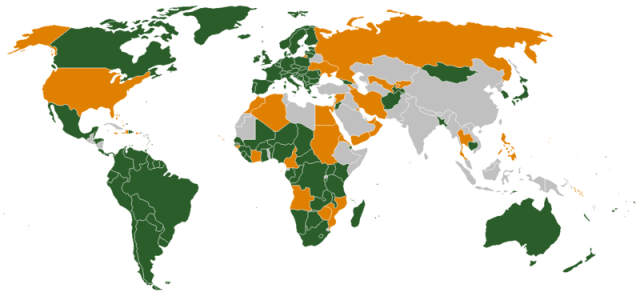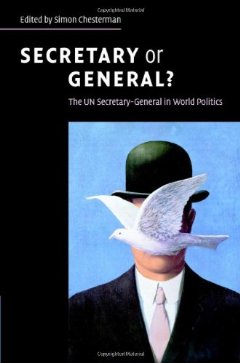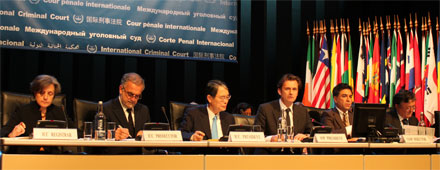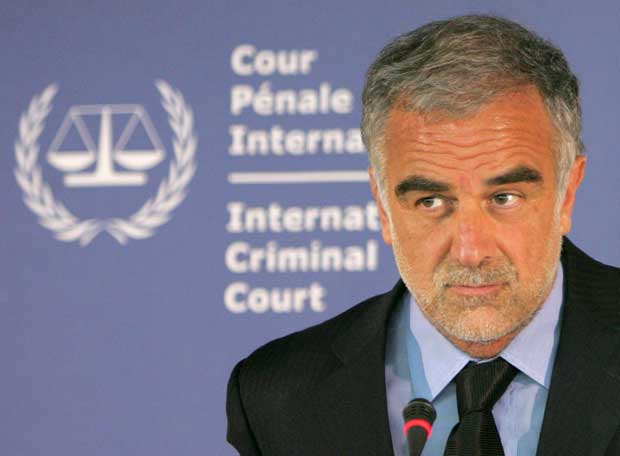The term of the ICC’s first Prosecutor, Luis Moreno-Ocampo, is slowly, albeit dramatically, drawing to a close. In December 2011 the members of ICC’s Assembly of State Parties will convene to choose the Court’s next Prosecutor. He or she will officially replace Moreno-Ocampo in June 2012. Every member-state of the Court will have one vote in deciding the ICC’s second prosecutor. In early February, the ICC set up a search committee to identify some potential candidates.
Moreno-Ocampo is the only chief Prosecutor the Court has ever known. Since 2002, when the ICC came into being, he has managed to shine a tremendous amount of spotlight on the workings of the Court. He has also managed to rub a lot of people the wrong way. His record will be something for scholars of all stripes to pour over in the coming years. But what about the next ICC Prosecutor? Who will he or she be?
There are a number of issues member-states will consider as they take time over the next few months to decide who they will support. A range of factors will surely shape the calculus of states as they inch towards the December vote. Here are a few considerations.
The Politics of Location
The question of the region and nation from which the next Prosecutor comes from is perhaps where the political inclinations of every state and non-state actor involved in the election will be strongest. This is also where the danger of vote trading is highest – states trading and grouping votes together on the basis of political considerations (eg. a vote in another international institution) rather than basing their decisions on the quality of the candidate.

The majority of members of the ICC are outside of North America and Europe (ratified members in green; signatories in orange)
It is highly unlikely that the Prosecutor will be North American or European. The vast majority of member-states come from Africa, South America and Asia. Africa still makes up the largest contingent and the AU has already been clear that it wants an African Prosecutor to lead the Court. Noting that none of the ICC’s top positions (ie. the heads of the Court’s four organs) are filled by an African citizen, there is a strong case to be made that the next Prosecutor should be African. According to one report, the AU will nominate a candidate this summer.
Moreno-Ocampo is an Argentine. One of his earliest professional roles was as an assistant prosecutor in the trial of Argentina’s Dirty War leaders. Will the next Prosecutor also come from a non-Western state which has persevered through mass human rights atrocities? It seems at least a distinct possibility. An African Prosecutor certainly wouldn’t be a bad political choice. A widely respected African candidate would dampen charges of neo-colonialism and the view of the Court as a European-Court against Africa.
An interesting political choice would also be an Arab and/or Middle Eastern candidate, perhaps from one of the Arab Spring states. This would only add to the impressive and powerful movement of Arab and Middle Eastern states towards recognition and greater participation in international criminal justice. It would be a remarkable signal to the world that the Middle Eastern and Arab states are going to be productive and engaged players in the pursuit of ending international impunity. Another possible choice would be an Asian candidate. Although the number of Asian ICC member-states remains small, the region is represented at the Court by the President, who is South Korean. Another high-profile international posting, that of the UN Secretary General, is almost guaranteed to be taken up by Ban Ki-Moon once again, another South Korean national. These factors could play a role against any Asian candidate for Chief Prosecutor at the ICC.
Secretary or General?
This factor is more about style rather than the substance of the next Prosecutor’s Curriculum Vitae. The Prosecutor is largely (if not officially) responsible for being the chief-spokesperson for the ICC and for many, for international criminal justice. In this context, the job is as much about how the Prosecutor goes about his/her business as it is about whatbusiness he/she conducts.

Cover of an edited volume by Simon Chesterman. Will the next ICC Prosecutor be a 'Secretary' or a 'General'?
The question of whether he or she will be a ‘secretary’ or a ‘general’ draws on debates about the selection of Ban Ki-moon as the most recent UN Secretary General. While his predecessor, Kofi Annan, was regarded as a ‘general’ – using his high-profile and secular pulpit to act as a norm entrepreneur on various fronts, Ban Ki-Moon has to date been a much more soft-spoken and behind-the-scenes kind of Secretary General. In other words, he is more a ‘secretary’ than a ‘general’. There is no doubt that on this scale, Moreno-Ocampo is more of a general than a secretary. He has literally been the face of the ICC during his term. As a Prosecutor he is remarkably charismatic and has garnered the Court more attention than most would have thought possible. For some, this has been the hallmark of his success. For others, Moreno-Ocampo’s willingness to bluntly “stick his fingers in it” has been a constant source of exasperation. Some, like the African Union Commission’s Chairman, Jean Ping has taken aim at the Prosecutor himself:
“Frankly speaking, we are not against the International Criminal Court. What we are against is Ocampo’s justice — the justice of a man.”
On the surface, it seems unlikely that states will want another Prosecutor with the aptitude to attract controversy like Moreno-Ocampo. Early rumblings suggest a greater likelihood of a secretary-type rather than a general-type as the next Prosecutor.
Experience and capability
Granted, this is the least ‘sexy’ and least political of criteria but perhaps the most important. The Prosecutor simply must have the right skill-set to be in charge of the Office of the Prosecutor at the ICC. There is likely to be a number of candidates with these qualifications, opening up space for the politics of decision-making to flourish (see above). The only real politicking that could theoretically occur here is if a member-state who was opposed to the Court attempted to nominate a complete dud as the next Prosecutor. It is not as crazy as you’d think: one of the ICC’s first judges didn’t have a law degree. Still, it is unlikely that a state would try to sabotage the Court by getting an inexperienced and under-qualified candidate nominated. The Rome Statute has specific guidelines that a potential Prosecutor must meet. The pertinent section, Article 42, specifies that the Prosecutor:
“shall be persons of high moral character, be highly competent in and have extensive practical experience in the prosecution or trial of criminal cases. They shall have an excellent knowledge of and be fluent in at least one of the working languages of the Court.”
 Further, human rights groups and interested parties will surely put pressure on states to elect a qualified candidate. Indeed, the Open Society Justice Initiative has already issued a statement outlining the qualities it wants to see in the next Prosecutor:
Further, human rights groups and interested parties will surely put pressure on states to elect a qualified candidate. Indeed, the Open Society Justice Initiative has already issued a statement outlining the qualities it wants to see in the next Prosecutor:
- demonstrated experience of professional excellence in complex criminal cases
- demonstrated ability to act with independence and impartiality in the exercise of professional duties
- a proven track-record of professional excellence in institutional management
- demonstrated experience in working with other bodies or agencies effectively
- demonstrated experience in communicating effectively to a wide variety of constituencies
In short, the Prosecutor’s experience and qualifications must allow him to wear two hats at the same time. He must be both a manager and a prosecutor.
Gender
Will the ICC member-states pursue gender equality as a criteria in the selection of a new Prosecutor? The same AU meeting which ended in an agreement to demand an African Prosecutor also concluded that gender equity should be considered. There is no shortage of highly qualified women. For anyone who doubts this, remember what Louise Arbour did for the ad hoc tribunals and the UN’s Human Rights Council (also, check out comments below). Sadly, international institutions have remained largely resistant to putting women into the most visible positions (I’m looking at you, UN, International Monetary Fund, World Bank!). Nevertheless, it would be an incredible day for gender equality if a woman were to be elected as ICC Prosecutor.
Your Views
Have I forgotten any important criteria? Do you have a possible candidate in mind? If so, let me know who and why they would be ideal. If you know who should be the next ICC Prosecutor, send along a description of the individual and why you think he/she should be chosen. If it’s good, I will feature it as a post!
As for states on the outside of the ICC who want to have a say there is only one way to make sure they have your voices heard: hurry up and join the Court!
************
Check out Tobias Hanson’s insightful response to this post here.




Mark,
One of the top positions — indeed, the number two position in the OTP — is indeed filled by an African citizen: Fatou Bensouda, who is from The Gambia.
And while we’re at it, Fatou — whom I have been fortunate enough to spend time with — would be my choice. She’s brilliant, tough, fair, and the reason that the OTP has not collapsed under the weight of Moreno-Ocampo’s incompetence. She’s also inspiring, having broken though every glass ceiling imaginable in The Gambia.
I agree with Kevin, Fatou for Prosecutor!
She seems a very serious and no-nonsensical person (not the really the words I associate with Ocampo), and she’s a very good in refuting “the neo-colonialist” critique. She’s African and a woman, so guess she’s simply the perfect candidate!
I concur with Kevin and Mathias.
During my time at the Coalition for the ICC, it seemed fairly obvious that Fatou Bensouda was the logical choice for next Prosecutor. Sub-Saharian African, a woman, competent (although, surprisingly enough, I have seen her make some incredible blunders once or twice in Court), and serious. In many ways, the opposite of everything we hate about LMO.
She’s a great candidate for both change and continuity, and I feel fairly confident that she will be the ASP’s choice.
Oh, and I might as well add that Judge Fatoumata Diarra, the Malian judge, is one of the two Vice-Presidents of the Court.
Kevin – thanks very much for your comment. I will start by saying it is an honour and pleasure to have someone with your breadth of knowledge and experience commenting here.
I should have made it more clear (and have updated the post) – the AU’s position was that “considering the fact that there was no African heading any of the main organs of the institution, an African candidate should therefore be considered for the post.” My use of “major post” clearly wasn’t the right choice of words.
I am familiar with Fatou Bensouda and will keep my eye out for her as a possible successor to Ocampo. It would seem to me that if she took over the post of Chief Prosecutor, she could also provide the Court with something I failed to mention: continuity. On another note, I agree with the enthusiasm of Mathias – it would be a remarkable day to see an African woman assume the position of chief Prosecutor.
Thanks Xavier!
For the correction re: “major posts” see the comment above. Briefly, the AU points to the lack of an African head of any of the ICC’s organs as an argument for the Prosecutor being an African.
It seems like Fatou Bensouda has some serious backing. I wonder who else will emerge as a candidate. The search committee suggests it is seeking at least three people to stand for election.
I really Like Bensouda, from the few times I’ve met her. But, just to play the devil’s advocate for a second here, she’s been working with Ocampo the whole time, and that cannot be just brushed aside. I’ve not heard her voice any concerns on the direction the OTP has taken and she’s obviously not been able to stir it in a better direction, expect if you suggest, as Kevin does, that things would have been even worse without her (The idea that things could have been even worse sends shivers down my spine…).
As for other candidates, I’ve also heard Jallow being mentioned. His stint at the ICTR makes him a sort of safe choice after Ocampo, because he follows orders, as his deference to Kagame shows…. so not my first choice. And the current ICTY Prosecutor’s name has also come up. Again as safe choice after Ocampo, but maybe less likely because he’s European.
Personally, in addition to someone more likeable, I just want someone who knows the law. It has certainly been entertaining to follow Ocampo’s press conferences, where he struggles with the minutia of the ICC Statute, but it’s time to have a Prosecutor who actually knows what he’s talking about.
At the outset let me point out that I admire Ocampo’s guts and his independence. I like the fact that he doesn’t seem to care whether he is liked or not, and he is not too concerned about his reputation, which is a plus for such a position. For the next candidate, I am getting tired of the suggestion that the candidate must have distinguished herself, whatever that means. A Prosecutor’s job is to prosecute. Yes the next prosecutor should have the diplomatic skills of Fatou Bensouda, and it won’t hurt if she is as likeable as Fatou; and the continuity she would bring is essential. Sure let the bureau suggest more names, but I do not think there is a more suitable candidate than Fatou Bensouda.
Are Africans only good for the dock? A time has come for the international community to live what they preach. Quality, efficiency, competency and all the qualities we are looking for in the new Prosecutor should be colour and gender blind. I have to register my disappointment with the manner in which the CICC, which I have previously respected as a credible neautral establishment has gone about its campaign to undermine Africa’s hardworking, excellent candidate. By the CICC boldly approaching other Africans and encouraging them to stand against Ms. Bensouda, we now realise that they are not geneuine partners for an effective Court. It is deplorable that the President of the ASP, who is reknown for his Diplomatic skills has not managed to restrain himself from showing blatant bias against Africa’s continent’s candidate. Does the international community really believe that we Africans are only good for the dock? Africans may appear naive but they are this time around above the game of divide and rule. Come July, the AU, an independent institution will endorse Fatou Bensuda as Africa’s only candidate. She has distinguished herself as a hardworking, efficient and effective Prosecutor. If the Court is serious about stumping out impunity, it has got to start from home. The bias shown in not recruiting Africans for high level positions in the Court, the prejudice shown to the Africans will only be brought to an end if the ASP and organisations like the CICC learn to respect Africa and Africans as equal partners. Fatou Bensuda has got everything we need for a prosecutor and not giving this job to her will be the Court’s worst mistake. It is obscene that the idea of having a Prosecutor from a non-States part can even be broached, how unfortunate!!! Fatou, you have done well, you are best suited for the job!!!
Fantastic comments from everyone. Many thanks to all for taking the time to share your views. Rather than respond to each comment, I will write up a post in the next few days highlighting and addressing them. Thanks once again!
Pingback: Electing the ICC’s Next Prosecutor: The Criteria — Global Memo
Pingback: ICC’s Next Top Prosecutor a Done Deal? — Global Memo
Pingback: Gambian woman to head international criminal court